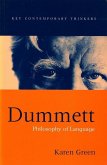Noam Chomsky has made major contributions to three fields: political history and analysis, linguistics, and the philosophies of mind, language, and human nature. In this thoroughly revised and updated volume, James McGilvray provides a critical introduction to Chomsky's work in these three key areas and assesses their continuing importance and relevance for today. In an incisive and comprehensive analysis, McGilvray argues that Chomsky's work can be seen as a unified intellectual project. He shows how Chomsky adapts the tools of natural science to the study of mind and of language in particular and explains why Chomsky's "rationalist" approach to the mind continues to be opposed by the majority of contemporary cognitive scientists. The book also discusses some of Chomsky's central political themes in depth, examining how Chomsky's view of the good life and the ideal form of social organization is related to and in part dependent on his biologically based account of human nature and the place of language within it. As in the first edition, McGilvray emphasizes the distinction between common sense and science and the difference between rationalist and empiricist approaches to the mind, making clear the importance of these themes for understanding Chomsky's work and showing that they are based on elementary observations that are accessible to everyone. This edition has been extensively re-written to emphasize Chomsky's recent work, which increasingly 'biologizes' the study of language and mind and - by implication - the study of human nature. This book will be of interest to students and scholars of philosophy, linguistics, and politics, as well as to all those keen to develop a critical understanding of one of the most controversial and important thinkers writing today.
Dieser Download kann aus rechtlichen Gründen nur mit Rechnungsadresse in A, B, BG, CY, CZ, D, DK, EW, E, FIN, F, GR, HR, H, IRL, I, LT, L, LR, M, NL, PL, P, R, S, SLO, SK ausgeliefert werden.
This is the best all around introduction to Chomsky s work that I know of. However, it is far more than an introduction. It is an ambitious synthesis of all parts of Chomsky s views written in a manner accessible to a beginner yet thought provoking for those deeply immersed in Chomskyana. It considers Chomsky s work in the wider context of cultural and classical philosophical views on human nature, knowledge and mind. In addition, McGilvray shuns no part of Chomsky s vast work. He provides accessible and illuminating discussions of both his theoretical work in grammar, his philosophical views on the structure of mind and his political views. I recommend McGilvray s work both to neophytes interested in an introduction to Chomsky s thought and to experts interested in an illuminating discussion of "how it all hangs together". Professor Norbert Hornstein, University of Maryland
This well written and insightful book explains accurately Chomsky s ideas about mind, language, and social ideas. Its presentation of key concepts is accessible to laypersons and is informative to the experts as well. Chomsky s key contributions to philosophy and the social sciences are well articulated. The book should be read by the general public, and all philosophers and social scientists. Professor Julius Moravcsik, Department of Philosophy, University of Stanford
This well written and insightful book explains accurately Chomsky s ideas about mind, language, and social ideas. Its presentation of key concepts is accessible to laypersons and is informative to the experts as well. Chomsky s key contributions to philosophy and the social sciences are well articulated. The book should be read by the general public, and all philosophers and social scientists. Professor Julius Moravcsik, Department of Philosophy, University of Stanford









